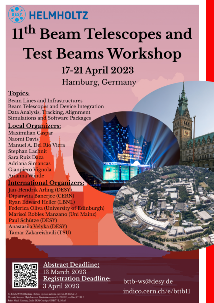Speaker
Description
In order to cope with the occupancy and radiation doses expected at the High-Luminosity LHC, the ATLAS experiment will replace its Inner Detector with an all-silicon Inner Tracker (ITk), containing pixel and strip subsystems. The strip subsystem will be built from modules, consisting of one or two n+-in-p silicon sensors, one or two PCB hybrids containing the front-end electronics, and one powerboard with high voltage, low voltage, and monitoring electronics. The sensors in the central region of the detector will use a simple rectangular geometry, while those in the forward region will use a radial geometry with built-in stereo angle.
To validate the expected performance of the ITk strip detector, a series of testbeam campaigns has been performed over several years at the DESY-II testbeam facility. Tracking was provided by EUDET telescopes, consisting of six Mimosa26 pixel planes. An additional pixel layer was used to improve the timing resolution of the telescope. Tracks are reconstructed using the General Broken Lines algorithm, resulting in a spatial resolution of several microns. In recent years the focus has been on assessing the module performance post-irradiation. Modules from different regions of the detector were built using sensors and/or front-end electronics irradiated to the maximum expectation from the HL-LHC, including a 50% safety factor. Measurements were performed of the charge collection, signal efficiency, and noise occupancy of the modules, as well as tracking performance in various sensor regions. The results give confidence in the operability of the detector across its lifetime.
